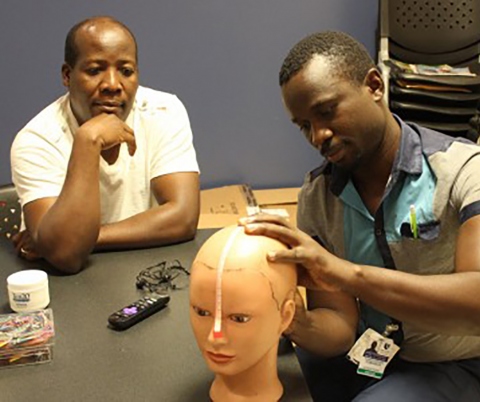Healthcare Provider Education to Reduce Epilepsy Care Disparities in Uganda (2020-2021)
Epilepsy is one of the most common (and most treatable) neurological disorders in the world, yet three in four people in low- and middle income countries do not receive care that they need. In Uganda, this treatment gap is further exacerbated due to stigma, widespread beliefs in non-biomedical etiologies and treatments for the condition, and other barriers which prevent or dissuade individuals from seeking and receiving care. Furthermore, severely limited specialized personnel resources means that those who do seek biomedical care are often treated by non-specialty providers, who are often undertrained to care for and communicate effectively with epilepsy patients.
Given these challenges, this team worked to bolster the mastery of epilepsy treatment for non-specialized providers by designing a culturally specific and sensitive epilepsy education course. The program drew from the WHO’s Mental Health Gap (mhGap) education modules with modifications made to reflect the specific setting based on interviews with Ugandan providers, availability of certain treatments, and consultation with the Ugandan National Health Guidelines.
The team worked with local Ugandan epilepsy experts and Duke epileptologists to tailor two specific content sections in the module: 1) patient-provider communications and 2) anti-epileptic drug (AED) prescribing rubrics. The content of these sections was informed by the WHO mhGAP 2.0 module, current Ugandan Clinical Guidelines and relevant research and practice related to AED medication efficacy and cultural influences. This material will be shared with the Ugandan Ministry of Health for implementation in a planned national epilepsy education program.
Timing
Fall 2020 – Summer 2021
Team Outputs
Epilepsy treatment curriculum, which was administered through the ADEPT (Advanced Delivery of EPilpesy Treatment) training program by the Ministry of Health of Uganda
“Walking the Journey Together”: Creating a Unique Learning Module in Provider-Patient Communication for the Care of Epilepsy in Uganda. Pratamesh Ramasubramanian, Neil Prose, Tyler Johnson, Colby Newson, Antoinette Charles, Olivia Ratliff, Angelina Kakooza-Mwesige, Martin Kaddumukasa, Noeline Nakasujja, Adrian Kayanja, Michael Haglund, Anthony Fuller, Deborah Koltai. 2023. Epilepsy & Behavior, Volume 140.
Evaluation of a Tailored Epilepsy Training Program for Healthcare Providers in Uganda. Anita Arinda, Simple Ouma, Kenneth Kalani, Pratamesh Ramasubramanian, Tyler Johnson, Antoinette Charles, Colby Newson, Olivia Ratliff, Angelina Kakooza-Mwesige, Paula Njeru, Martin Kaddumukasa, Mark Kaddumukasa, Bradley Kolls, Aatif Husain, Dmitry Tchapyjnikov, Michael Haglund, Anthony Fuller, Neil Prose, Deborah Koltai. 2022. Epilepsy & Behavior, Volume 138.
Healthcare Provider Education to Reduce Epilepsy Care Disparities in Uganda (poster by Pratamesh Ramasubramanian, Olivia Ratliff, Tyler Johnson, Antoinette Charles, Colby Newson, Wyatt Gildea, Deborah Koltai and Neil Prose)
Bridging the Gap in Epilepsy Care in Uganda through International Partnerships (Team profile)
Reflections
Selected team member reflections
Video
Epilepsy Care in Low Income Communities: Erasing Stigma, Saving Lives
This Team in the News
Understanding the Influence of Spiritual Beliefs on Epilepsy Care
Duke Innovates Together to Advance Health Care
Two Faculty Receive Inaugural Bass Connections Leadership Award
A Holistic Approach to Neurological Care in Uganda
This project team was originally part of the Education & Human Development theme of Bass Connections, which ended in 2022. See related teams, Cultural and Practical Barriers to Epilepsy Care in Uganda (2021-2022) and Cultural and Practical Barriers to Epilepsy Care in Uganda (2018-2019).
Image: Christopher Komakech demonstrates how to place electrodes for an EEG exam, from Fighting Epilepsy in Uganda with Tools and Teamwork, Duke Global Health Institute website

Team Leaders
- Deborah Koltai, School of Medicine-Psychiatry and Behavioral Sciences;Neurology
- Neil Prose, School of Medicine-Dermatology
/graduate Team Members
-
Antoinette Charles, Medicine-MD
/undergraduate Team Members
-
Michael Gildea, Public Policy Studies (AB)
-
Tyler Johnson, Psychology (AB)
-
Pratamesh Ramasubramanian, Biology (BS)
-
Olivia Ratliff, Computer Science (BS)
/yfaculty/staff Team Members
-
Anthony Fuller, School of Medicine-Neurosurgery
-
Michael Haglund, Duke Global Health Institute|School of Medicine-Neurosurgery
/zcommunity Team Members
-
Mark Kaddumukasa, Department of Medicine, Makerere University
-
Martin Kaddumukasa, Department of Medicine, Makerere University
-
Angelina Kakooza, Department of Medicine, Makerere University
-
Colby Newson, Medical Student, University of Virginia
